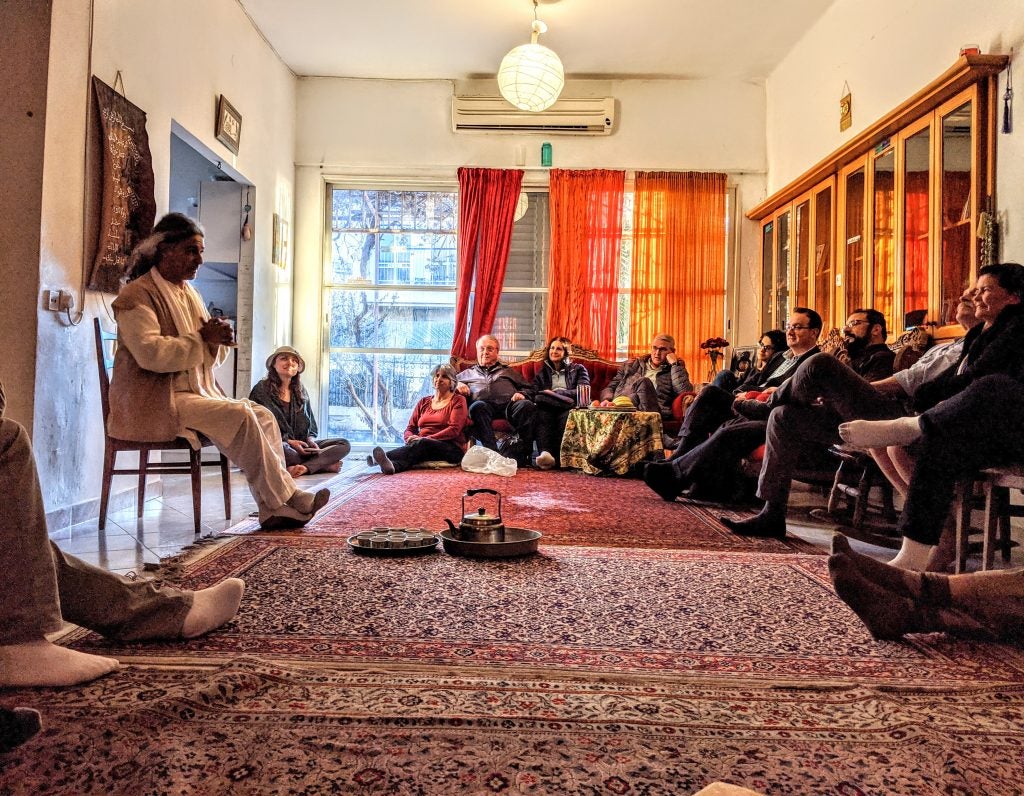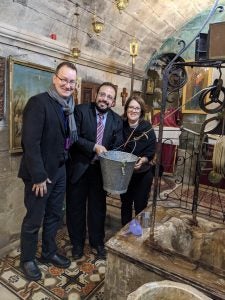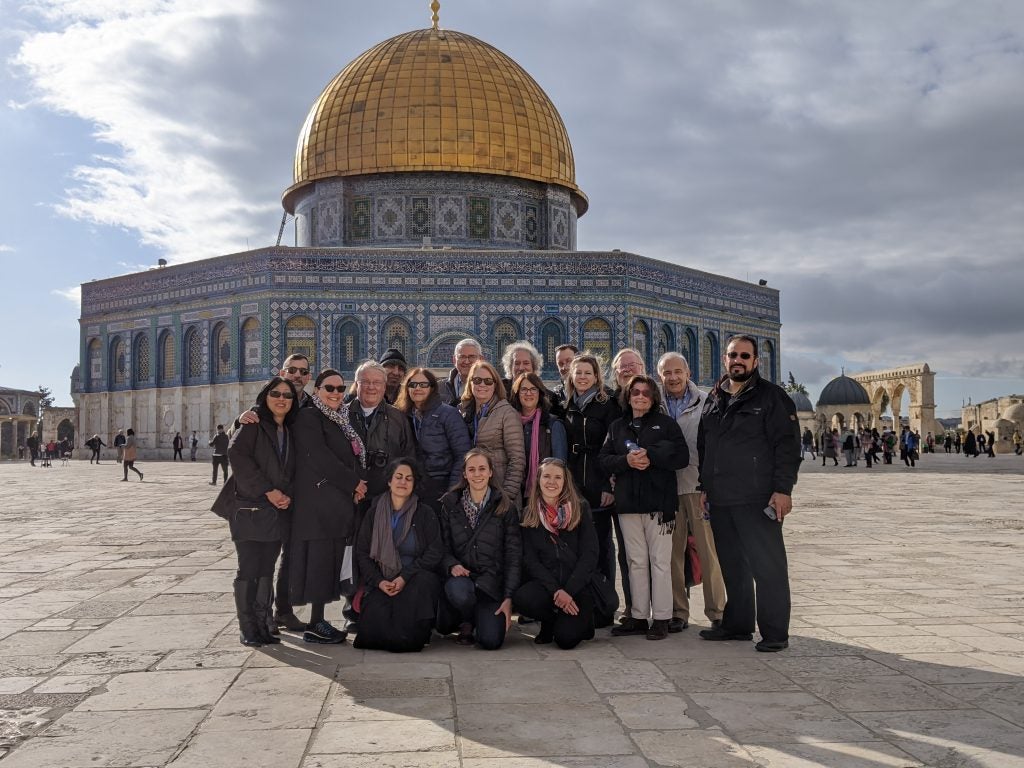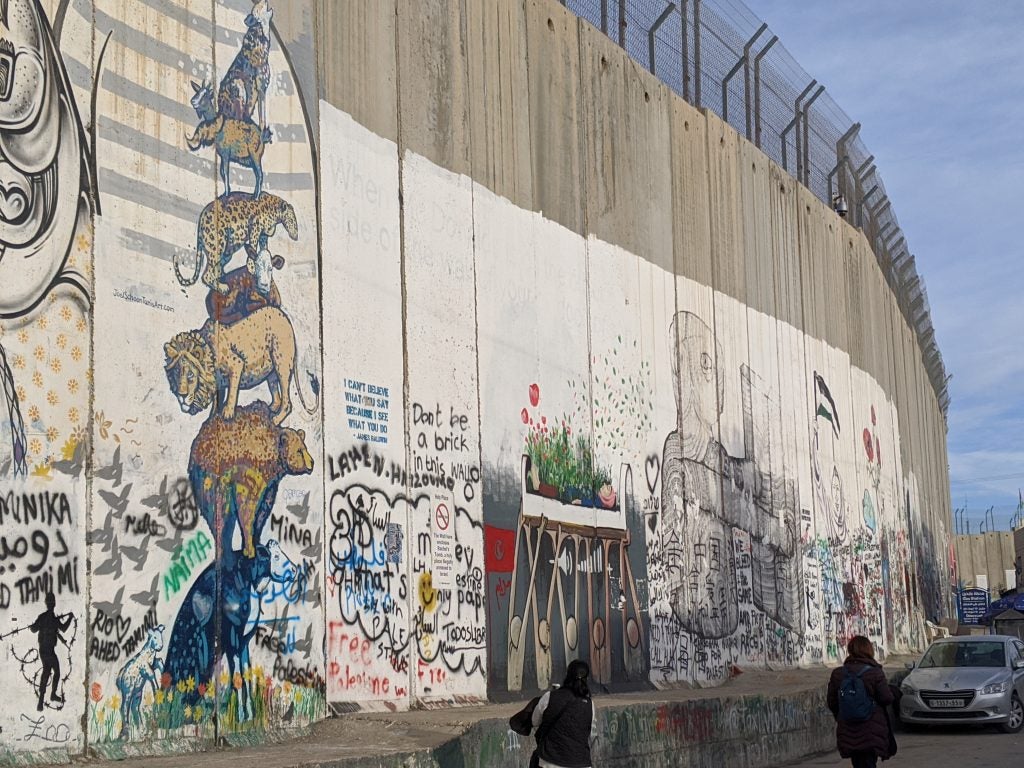The Bravery of Connection
Over the winter break, Vicki Valosik participated in an interfaith pilgrimage to the Holy Land with a group of Georgetown faculty and staff. Led by Imam Yahya Hendi, director of Muslim Life, Rabbi Rachel Gartner, director of Jewish Life and Father Mark Bosco, SJ, vice president for Mission and Ministry, participants traveled to sites of spiritual and political importance throughout the West Bank and Israel.
“Disconnection makes greater vision impossible.”
A few months ago, these words spoken by Rabbi Dr. Yakov Nagen—who works with an organization called Abrahamic Reunion to bring together leaders of different faith traditions—would have sounded abstract and nebulous to me. But by the time we met with Rabbi Nagen on day five of our journey through the Holy Land, the reality of his words were coming into stark and granular relief.
The physical barriers to human connection in this beautiful land—the walls, barricades, and checkpoints erected by the Israeli government in response to the discord and violence between Israelis and Palestinians—are obvious and unavoidable. They are disruptive, if not devastating, to the daily lives of hundreds of thousands, particularly the Palestinians who live under an ever-present military occupation that the Israeli government deems essential for its security. Whether intended as a way to minimize a growing death-toll between two peoples or as a nefarious means to divide, the impact of these barriers is disastrous, and living every day in their shadow is the terrible, terrible price Palestinians pay. Perhaps even more dangerous than the physical barriers, however, are the psychic ones—misunderstanding, suspicion, fear—that these walls create and perpetuate….and that often seem insurmountable. For many Palestinians and Israelis, the only time they will interact with ‘the other’ is at an armed checkpoint.
And yet, despite the destructive realities of the physical and psychic disconnections, we witnessed beautiful and deeply meaningful points of shared humanity.
In Jerusalem, we met Rami Elhanan and Bassam Aramin—an Israeli and a Palestinian respectively—each of whom lost a young daughter in the conflict. After working through what Rami described as the natural tendency toward rage and revenge in the face of such senseless loss, both men realized that this path would not ease their pain and instead chose the more difficult road toward understanding and empathy. Their journeys eventually led them to one another and to the Parents Circle Families Forum, an organization made up of Palestinians and Israelis who have lost loved ones to the conflict and now advocate together for peace. Bassam and Rami, best friends united in their pain and hope, celebrate family gatherings and holidays together. They speak to school groups, visiting delegations, “anyone who will listen and anyone who won’t listen,” said Rami. “We constantly bang our heads against the wall of hate, hoping to make small cracks that will let a tiny light through.” Eventually, he said, enough cracks can bring down an entire wall.

Visiting with Ihab Balha, cofounder of Bustan Yafa, a bilingual kindergarten where Palestinian and Israeli children learn and play together.
In Jaffa, we visited the warm and loving home of Ihab and Ora Balha, a Palestinian Muslim and an Israeli Jew, who met—and later married—through their mutual work in interfaith and multicultural dialogue. As we sat on pillows and drank tea in their living room, Ora and Ihab recounted their struggles to overcome personal prejudices and to chip away at family and societal obstacles both to their vocation and to their marriage. After they had their first child, they looked for a school where their children could speak both Arabic and Hebrew and expand on the openness and inclusivity they embraced home. Finding none, the couple cofounded Bustan Yafa, a bilingual Waldorf kindergarten where Israeli and Palestinian children play and learn together, and where these interactions are normalized from an early age. Ihab and Ora have since founded six additional kindergartens in Jaffa and the Galilee and are hoping to expand this model to elementary education.

Father Bosco SJ, Imam Hendi, and Rabbi Gartner drinking from Jacob’s well, where Jesus rested and spoke with a Samaritan woman.
These and other stories we witnessed seem to involve superhuman feats of crossing impossible chasms. Indeed, recognizing the shared humanity across these chasms takes deliberate effort and tremendous courage. And yet, each story has a turning point that hinges on a single step—extending an olive branch or stepping forward to receive it. For Rami, that step was allowing himself to be consoled by people he once considered enemies. For Ihab, it was agreeing to have a conversation with a man who had been harassing him at his place of work. The vulnerability and bravery behind these “small” actions spiraled into something much bigger and lasting: genuine connection and shared hope where there was none. As we walked the Stations of the Cross in Jerusalem, I took inspiration from the story of Veronica, the woman who wiped the blood and sweat from Jesus’ face…a simple act of kindness, but one that took bravery and public action. She stepped out from the crowd and reached toward another’s pain, instead of turning away. What I hope we can all carry from this pilgrimage is a greater willingness to see the pain of those around us, the bravery to respond when it means stepping out of our comfort zones, and the vulnerability to allow ourselves to be changed in the process.
Vicki Valosik is the multimedia & publications editor at Georgetown’s Center for Contemporary Arab Studies, as well as an adjunct instructor for the School of Foreign Service. Photo credit: all photos contributed by Vicki Valosik

